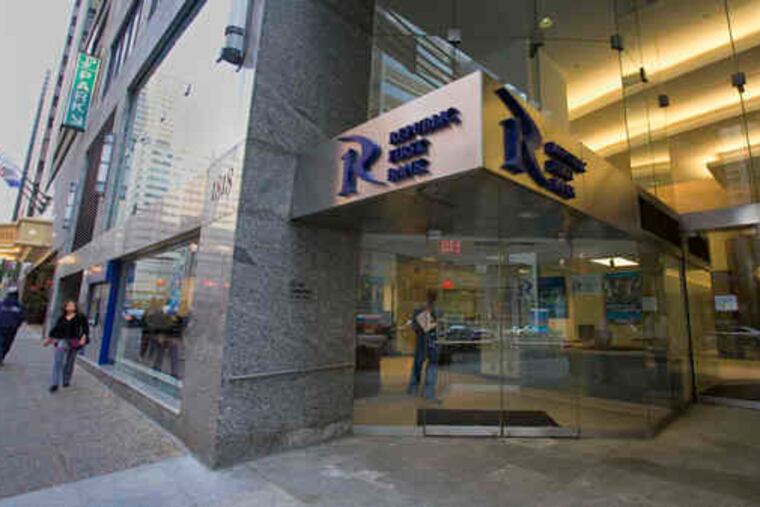PhillyDeals: College endowment funds post modest 10-year returns
College endowment investments have posted average returns of just 4.2 percent a year over the last 10 years. They'd have done better, in hindsight, to put alumni millions into Treasury bonds - or the old Vanguard Wellington stock-and-bond fund, which also returned an average 4.2 percent a year - instead of spreading so much into diverse, creative, high-fee funds that haven't performed.

College endowment investments have posted average returns of just 4.2 percent a year over the last 10 years.
They'd have done better, in hindsight, to put alumni millions into Treasury bonds - or the old Vanguard Wellington stock-and-bond fund, which also returned an average 4.2 percent a year - instead of spreading so much into diverse, creative, high-fee funds that haven't performed.
The endowment results were calculated, through a survey of 504 schools, for the decade ending June 30, by two groups: the National Association of College and University Business Officers, and Commonfund, a nonprofit $25 billion investment manager whose clients are mostly colleges. They plan an 800-school survey next year.
Despite the modest 10-year returns, colleges haven't abandoned private firms and complex strategies. The survey says they have more than half their current endowment money committed to "less-liquid" (hard-to-sell) corporate-buyout, hedge, real estate, commodity and venture funds, and less than half to stocks and bonds.
Some is stuff they bought in fat times and "can't sell," acknowledges William F. Jarvis, head of Commonfund's research arm.
But mostly, funds are right to stay diversified, he says. Colleges that "lost the least" got lucky: They held a lot of cash and bonds, which "are not going to get high enough yields to sustain your mission," Jarvis said.
Long-term investors are "condemned to having to take risk," Jarvis concluded. "The goal is to know and measure that risk, and invest accordingly."
Failures eclipse mergers
The Federal Deposit Insurance Corp. has had to seize and close more than 130 banks and bail out their depositors so far this year. None was in the Philadelphia area.
But at least two local banks that had expected to do deals earlier this year are still waiting for Washington's go-ahead.
Is the government rightly skeptical of all bank proposals these days? Or are regulators too busy bailing out aggressive bankers in metro Atlanta, Las Vegas, and other easy-lending markets, to back combinations in sober Philadelphia?
The Bancorp Bank of Philadelphia and Wilmington, headed by former Jefferson Bank chief executive Betsy Z. Cohen, said last June it would pay a bargain-basement $9 million for Chicago-based subprime lender American Home Mortgage Holdings' federal savings bank unit and its loans.
But the American Home deal still hasn't been approved. "The Federal Reserve has been busy," Bancorp spokesman Andres Viroslav told me. "We, among others, are still waiting to hear a response to our application."
Likewise, Republic First Bank of Philadelphia, whose lead investor is Vernon W. Hill 2d, ex-head of the former Commerce Bank, has missed a series of deadlines in its planned merger with Metro Bank (formerly Commerce Bank of PA) in Harrisburg.
That combination was supposed to clinch by June, by August, by October; it's sliding toward next year. Republic says it, too, is waiting for regulators.
"Sounds strange to me," bank investor Cengiz Searfoss, of New York-based DSC Capital, told me. "We've seen a lot of deals close that have some complexity," like New England-based United Financial Bancorp's takeover of Commonwealth National Bank earlier this month.
In that case, he explained, "two different regulators were involved, and it closed in a six-month time frame."
By contrast, the Metro deal "has taken more than a year," even though Hill "is steamrolling ahead," hiring people who used to work for him at Commerce Bank, and promoting another planned Metro Bank in England, as if all's well. Searfoss is worried the bank will need more capital. Regulators won't comment. Nor will Hill.
Analyst Frank Schiraldi, who follows Bancorp Bank for Sandler O'Neill & Partners L.P. in New York, says he's not worried. "Regulators are quite backlogged," and he's been hearing about merger delays "lots of places," he told me. "I wouldn't read too much into it."